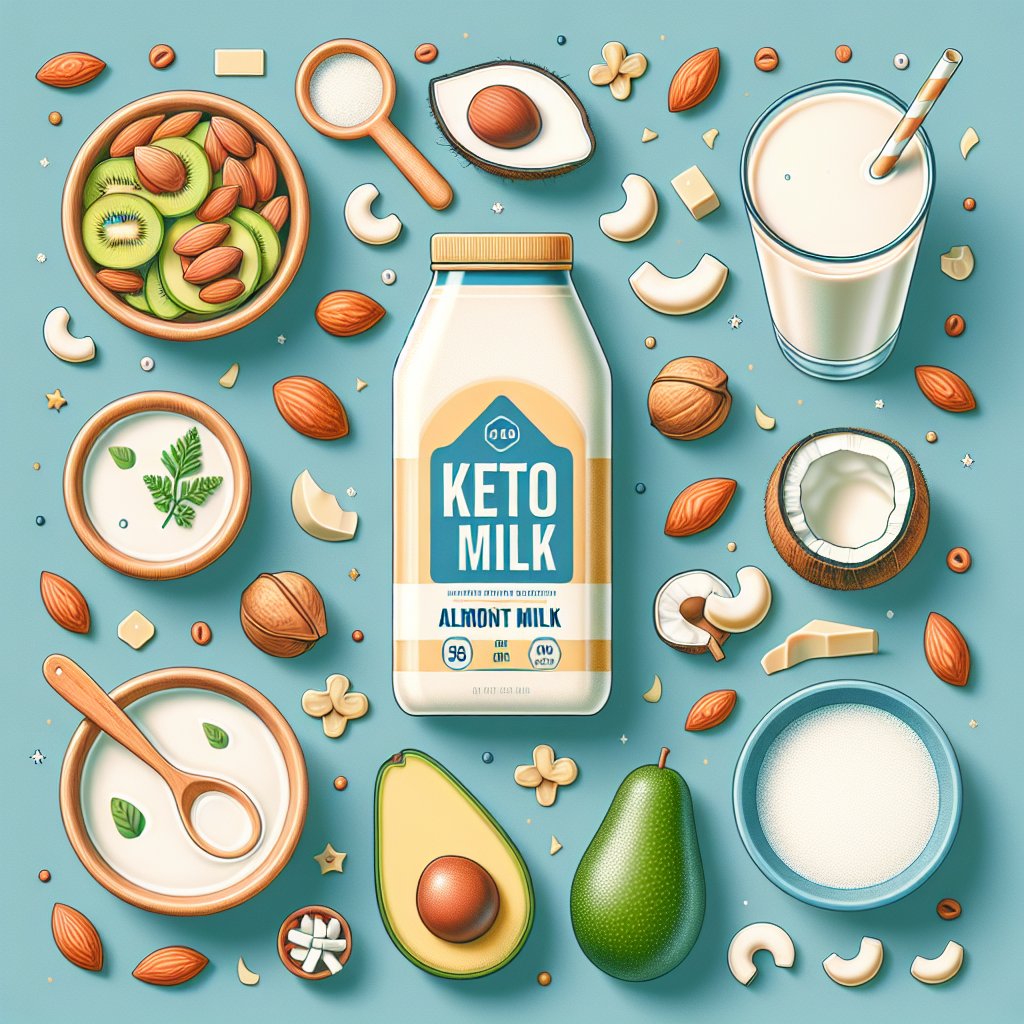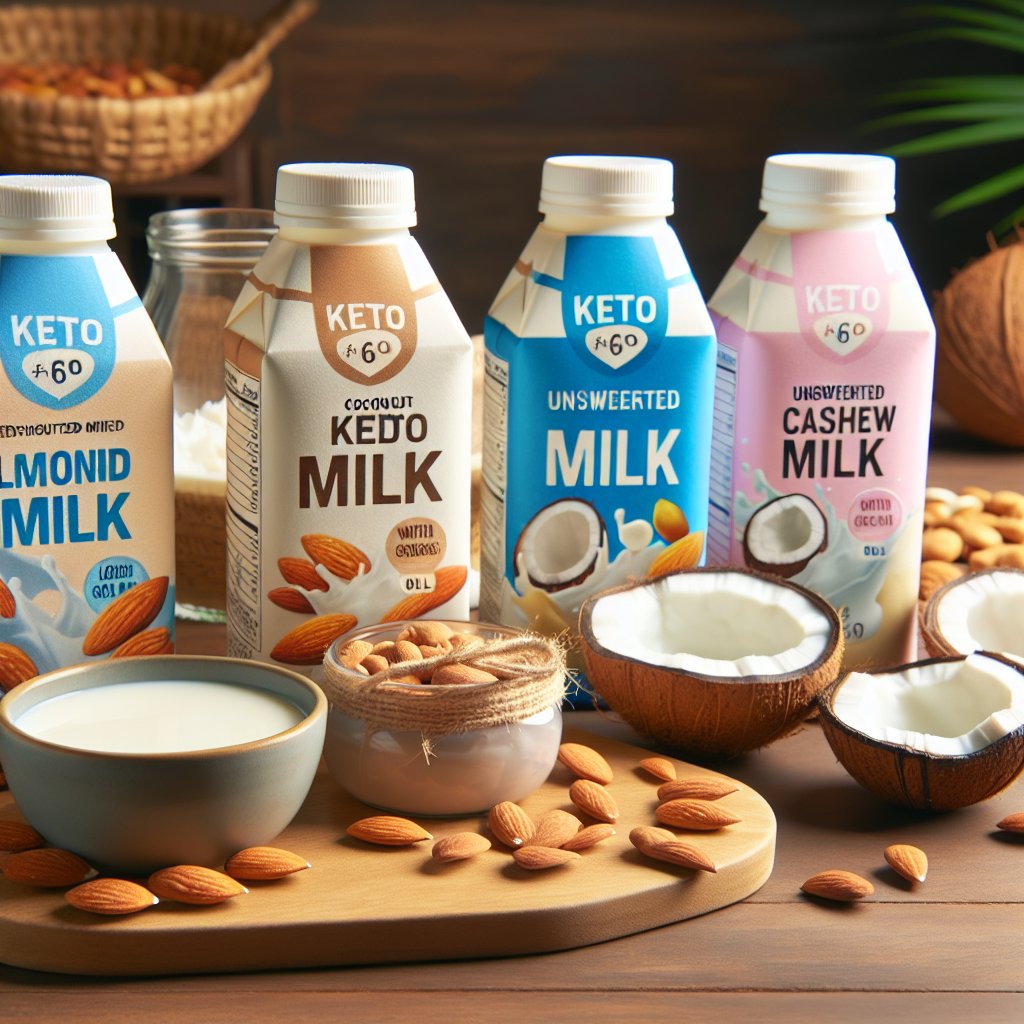Unleash the Power of Keto-Friendly Milk: What Milk Can You Have on Keto?
Unleash the Power of Keto-Friendly Milk: What Milk Can You Have on Keto?
Welcome to our keto-friendly kitchen! Today, we’re diving into the creamy world of milk and its compatibility with the ketogenic diet. If you’re one of the many individuals who are passionate about keto, you know it’s all about low-carb, high-fat intake. But what exactly does that mean? Let’s explore the wondrous world of the ketogenic diet and how it can be tailored to include the dairy essential: milk.
The ketogenic diet, or keto diet, is a low-carb, high-fat eating plan that offers various health benefits. When following a ketogenic diet, your body enters a state of ketosis, wherein it becomes incredibly efficient at burning fat for energy. The primary goal is to drastically reduce carbohydrate intake and replace it with healthy fats, leading to a significant reduction in blood sugar and insulin levels. This not only aids in weight loss but also has potential benefits for conditions like diabetes, epilepsy, and more.
But how do we apply this to our dairy choices? Well, as we venture into the ketogenic lifestyle, it’s crucial to understand what milk can you have on keto, its nutritional value, and how it aligns with the principles of this transformative diet. Let’s explore the world of keto-friendly milk together!

The Benefits of Milk on Keto
When it comes to the ketogenic diet, many people have questions about whether milk can be included in a keto-friendly lifestyle. Let’s uncover the nutritional benefits of milk and its potential role in a keto diet.
Nutritional Benefits of Milk
Milk is a rich source of essential nutrients, making it a valuable addition to a balanced diet. It is packed with high-quality protein, which is essential for muscle repair and growth.
Additionally, milk is an excellent source of calcium, vital for maintaining strong bones and teeth. Moreover, it contains B vitamins, including B12, necessary for energy production and the functioning of the nervous system. The presence of vitamin D in milk further enhances calcium absorption, supporting overall bone health.
It’s noteworthy that whole milk provides a healthy dose of saturated fats, conjugated linoleic acid, and omega-3 fatty acids, which offer various health benefits, including supporting heart health and reducing inflammation. Furthermore, these fats contribute to a feeling of satiety, potentially reducing overall calorie consumption.
The Potential Role of Milk in a Keto Diet
Now, let’s address the question: can you have milk on a keto diet? The answer lies in understanding the carbohydrate content of milk. While milk is nutrient-dense, it naturally contains lactose, a type of sugar. Whole milk contains approximately 11-12 grams of net carbs per one cup (240 ml).
For individuals following a strict keto diet, particularly those aiming for a low-carb intake, consuming regular milk in large quantities may not align with their macronutrient targets. However, there are keto-friendly milk alternatives that can be incorporated into the diet while maintaining ketosis.
Options such as unsweetened almond milk, coconut milk, and macadamia nut milk offer significantly lower carb counts, making them suitable choices for those adhering to a ketogenic lifestyle. These alternatives provide the creamy texture and versatility of milk without the higher carbohydrate content.
By making mindful choices and being aware of the carbohydrate content, individuals can still enjoy the benefits of milk while staying within their daily carb limits on the keto diet.
In conclusion, while regular milk may not be the most compatible option for those strictly following a keto diet, there are plenty of low-carb milk alternatives that offer the nutritional benefits of milk without compromising one’s macronutrient goals.
Now that we’ve explored the nutritional benefits of milk and its potential role in a keto diet, it’s clear that with informed choices, milk can indeed have a place in a keto-friendly lifestyle.
Types of Milk Allowed on Keto
When it comes to following a ketogenic diet, choosing the right kind of milk is crucial to ensuring you stay within your daily carb limit while still enjoying a creamy addition to your coffee or cereal. The good news is that there are several types of milk that are not only delicious but also keto-friendly. Let’s take a closer look at some of the best options:
Almond Milk
Almond milk is a popular choice for those following a ketogenic diet. It is low in carbs, with only 1-2 grams of net carbs per serving, making it an excellent alternative to regular milk. Moreover, almond milk is rich in vitamin E and contains healthy fats, which can further support your keto lifestyle.
Coconut Milk
Another great option for the keto diet is coconut milk. With less than 1 gram of net carbs per cup, this creamy and slightly sweet milk can be a versatile addition to your recipes. Additionally, coconut milk contains lauric acid, which has been linked to various health benefits, including supporting heart health and boosting immunity.
Unsweetened Cashew Milk
Cashew milk is a creamy and nutty-flavored beverage that is also suitable for a ketogenic lifestyle. It contains around 1-2 grams of net carbs per serving and is often fortified with calcium, vitamin D, and other essential nutrients. It’s a fantastic option for those looking to add richness to their keto meals without consuming too many carbs.
When choosing any type of milk for your ketogenic diet, it’s essential to opt for unsweetened versions. Sweetened or flavored milks can contain added sugars and significantly higher carb counts, which are not conducive to ketosis.
Ultimately, the type of milk you choose on a keto diet will depend on your personal preferences and dietary requirements. Whether you enjoy the nuttiness of almond milk, the richness of coconut milk, or the creaminess of cashew milk, there are plenty of keto-friendly options to cater to your taste.
Experiment with different types of milk to find the one that best complements your keto lifestyle and adds a delightful touch to your favorite recipes.

Nutritional Comparison: What Milk Can You Have on Keto?
When it comes to the ketogenic diet, choosing the right milk alternative is crucial to ensure you stay in ketosis while enjoying your favorite dairy products. Let’s delve into the macronutrient content of different milk alternatives and their impact on ketosis.
Almond Milk
Almond milk is a popular choice for those following a ketogenic lifestyle due to its low carbohydrate content. A one-cup serving of unsweetened almond milk contains only 1-2 grams of carbs, making it an excellent choice for keto enthusiasts.
Coconut Milk
Coconut milk is another keto-friendly option, especially the canned variety. It is rich in healthy fats and has negligible carbohydrates, making it a great addition to your keto meal plan. However, be mindful of the portion size as it is calorie-dense.
Cashew Milk
Cashew milk is a creamier alternative and generally contains around 3-4 grams of carbs per serving, which can fit into a well-managed ketogenic diet. It offers a rich texture and can be a tasty addition to your keto smoothies or coffee.
Oat Milk
Oat milk, while a popular dairy-free option, contains a higher carb content compared to other alternatives, with around 12-15 grams of carbs per cup. As a result, it may not be the most suitable choice for those strictly following the keto diet.
Choosing the right milk alternative largely depends on your personal carbohydrate tolerance and overall macronutrient goals. It’s essential to carefully read the nutrition labels and select the option that best aligns with your keto lifestyle.
Ultimately, incorporating keto-friendly milk alternatives into your diet can provide variety and essential nutrients while supporting your ketogenic journey.
Best Practices for Choosing Keto-Friendly Milk
So, you’re committed to the ketogenic lifestyle, and you’re wondering, “What milk can you have on keto?” It’s important to make the right choice when it comes to selecting milk options that align with your keto goals. Here are some helpful tips to guide you through the process:
Check the Labels for Added Sugars and Carbohydrates
When it comes to choosing keto-friendly milk, the first thing to do is to carefully examine the labels. Look out for added sugars and high carbohydrate content, as these can significantly impact your ketosis. Opt for unsweetened varieties and always check the total carbohydrate content per serving. Aim for milk options that have minimal carbohydrates.
Research has shown that higher intake of added sugars and carbohydrates can elevate blood sugar levels and hinder the body’s ability to stay in ketosis. In fact, a study published in the journal Nutrients found that reducing the intake of added sugars and refined carbohydrates can effectively support the maintenance of a state of nutritional ketosis, promoting fat burning and weight management.
Another study in the American Journal of Clinical Nutrition indicates that excessive carbohydrate consumption can lead to a decline in insulin sensitivity, potentially compromising your keto efforts. By choosing milk options with low to zero added sugars and carbohydrates, you can better support your ketogenic goals.
It’s important to note that while cow’s milk is generally higher in naturally occurring sugars like lactose, there are plenty of keto-friendly milk alternatives available, such as almond milk, coconut milk, and hemp milk, which are typically lower in carbohydrates. These unsweetened plant-based milks can be fantastic options for those following a ketogenic lifestyle.
Understanding the nutritional content of various milk options is vital for making informed choices. When you’re at the grocery store, take the time to compare labels and select the milk that best fits your keto goals.
By taking these simple steps and being mindful of added sugars and carbohydrates, you can confidently choose the best milk options that support your keto lifestyle.

Recipes Using Keto-Friendly Milk
Are you looking for tasty and keto-friendly recipes that use low-carb, keto-approved milk substitutes? Look no further! We’ve got you covered with some delicious ideas that will help you unleash the power of keto-friendly milk in your culinary adventures.
One of the most popular and versatile keto-friendly milk substitutes is almond milk. It’s low in carbs and high in healthy fats, making it an excellent choice for those following a ketogenic lifestyle. Almond milk works wonderfully in both sweet and savory recipes, adding a subtle nutty flavor and creamy texture. You can use it in your morning smoothies, creamy soups, and even in keto-friendly desserts like chia seed pudding or almond milk custard.
Coconut milk is another fantastic keto-friendly milk option that can elevate your cooking to new heights. Rich and creamy, coconut milk is a key ingredient in many keto recipes. From coconut milk-based curries to decadent coconut milk-based ice cream, the possibilities are endless. You can also use it in your coffee or tea for a luscious, dairy-free creamer alternative.
For those who prefer a slightly tangy flavor, unsweetened dairy-free yogurt made from almond milk or coconut milk is an excellent choice. Use it as a base for a refreshing keto-friendly smoothie bowl, or incorporate it into your marinades and salad dressings for an extra dimension of creaminess.
Experimenting with keto-friendly milk substitutes in your recipes can open up a whole new world of flavors and textures, while keeping you in line with your ketogenic goals. These versatile and delicious options will not only satisfy your taste buds but also support your journey towards a healthier, low-carb lifestyle.
Potential Drawbacks and Considerations
While milk can be a part of a ketogenic diet, there are potential drawbacks and considerations to keep in mind, especially for individuals with specific dietary needs.
Lactose Content
One of the primary considerations when consuming milk on a keto diet is its lactose content. Milk contains lactose, a natural sugar that can affect blood sugar levels and potentially hinder ketosis. For individuals who are sensitive to lactose or aiming for strict ketosis, it might be beneficial to choose lactose-free or lower-lactose milk options such as almond milk, coconut milk, or macadamia milk. These alternatives provide the creamy texture of milk without the significant lactose content, making them more compatible with a ketogenic lifestyle.
Portion Control
Additionally, portion control is essential when incorporating milk into a keto meal plan. While milk is a source of essential nutrients, including protein, calcium, and vitamins, it also contains carbohydrates. It’s crucial to be mindful of the portion size to avoid consuming excess carbs, which could potentially impact ketosis. Opting for small servings or diluting milk with water can help manage the carbohydrate intake while still enjoying its benefits. Being mindful of portion sizes can make a significant difference in maintaining ketosis while reaping the nutritional advantages of milk.
By considering lactose content and practicing portion control, individuals can navigate the potential drawbacks of consuming milk on a ketogenic diet while still enjoying its taste and nutritional benefits.
What milk can you have on keto?
Conclusion
As we wrap up our exploration of keto-friendly milk options, it’s important to highlight the significant role that milk can play in a ketogenic diet. From almond milk to coconut milk to unsweetened dairy milk, there are various choices that can be incorporated into your keto lifestyle. Research has shown that consuming moderate amounts of dairy products, including milk, can contribute to weight loss and improved body composition in the context of a well-formulated ketogenic diet.
However, it’s crucial to emphasize the importance of mindful consumption when it comes to any type of milk on keto. While some milk options are low in carbs and can easily fit into your daily macros, others may contain added sugars or higher carb counts, which can hinder your ketosis efforts if consumed excessively. Being aware of the nutritional content and choosing unsweetened, low-carb varieties is key to achieving optimal success with your keto journey.
Ultimately, the best milk for your ketogenic diet depends on your personal preferences, tolerance, and goals. Experimenting with different types of milk can help you find what works best for you while ensuring that you are staying within your daily carb limits.
So go ahead, unleash the power of keto-friendly milk in your daily routine, but always remember to make mindful choices that align with your health and wellness objectives.


